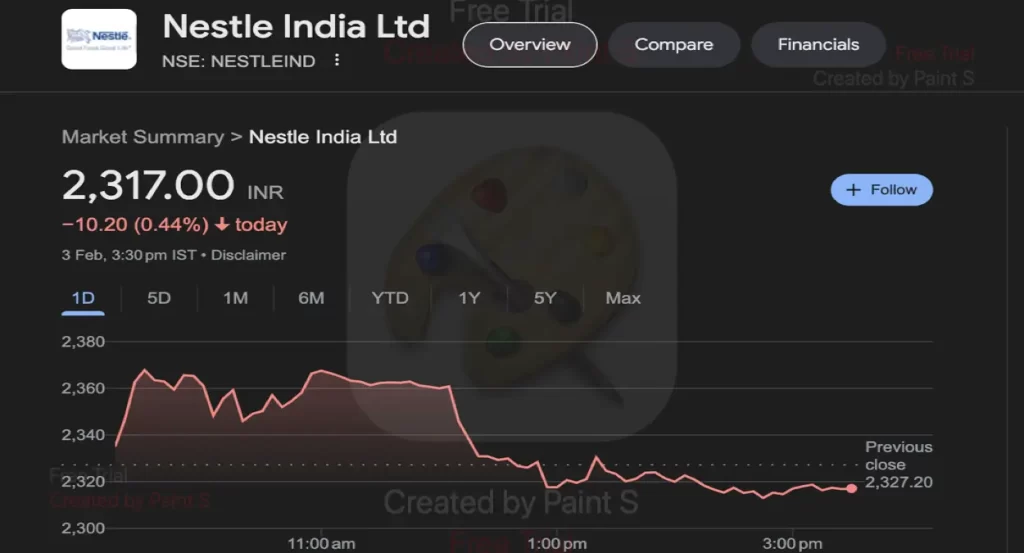Nestle India Share Price Target: Nestle India is one of the most trusted FMCG companies in the Indian market. Known for its popular brands like Maggi, Nescafé, and KitKat, the company enjoys a strong presence in households across the country.
Investors likely to consider Nestle India a safe and reliable stock due to its consistent growth and solid fundamentals. In this article, we will explore the share price target for Nestle India from 2025 to 2030, the reasons behind these targets, its fundamentals, technical analysis, and comparisons with peers and top Nifty 50 stocks.
Nestle India Share Price Target Year-Wise: 2025 to 2030
Here’s an estimated year-wise share price target for Nestle India based on current trends, company performance, and market conditions:
| Year | Target Price (₹) |
|---|---|
| 2025 | ₹2317 – ₹3317 |
| 2026 | ₹3317 – ₹3417 |
| 2027 | ₹3517 – ₹4000 |
| 2028 | ₹4330 – ₹5300 |
| 2029 | ₹4351 – ₹4617 |
| 2030 | ₹5200 – ₹5500 |
These targets are based on growth in revenue, market share, and expansion in product categories. However, these are estimates, and actual performance may vary due to market volatility and macroeconomic factors.
Reasons Behind the Share Price Targets
- Brand Strength: Nestle India’s strong portfolio of trusted brands ensures consistent demand, helping maintain a competitive edge.
- Rural Expansion: The company is focusing on rural areas, which are expected to boost sales significantly.
- New Product Launches: Innovative launches like health-conscious snacks and beverages cater to modern consumer needs, adding to revenue.
- Market Leadership: Nestle India continues to dominate categories like instant noodles, dairy, and chocolates, giving it a steady revenue stream.
- Government Support: Initiatives like ‘Make in India’ and rural development are favorable for FMCG growth in the country.
Year-Wise Share Price Target for Nestle India (2025 to 2030)
In this section, we will discuss detailed year-wise share price targets for Nestle India, including the factors driving the stock’s potential growth and the company’s strategic moves to capture more market share.
Nestle India Share Price Target 2025
In 2025, Nestle India is expected to maintain a strong growth trajectory. As the FMCG sector benefits from increased urbanization and rising disposable incomes, Nestle is well-positioned to capitalize on this demand. With its strong portfolio, including Maggi, Nescafé, KitKat, and dairy products, the company could witness steady growth in sales.
Additionally, expansion in rural markets is likely to boost the company’s revenue, as rural consumers increasingly adopt branded packaged goods. The introduction of healthier product variants and new launches may further contribute to sales growth. Therefore, the share price could range between ₹2317 to ₹3317 by the end of the year.
Nestle India Share Price Target 2026
By 2026, Nestle India is expected to see an even stronger financial performance as it continues to focus on innovation and premiumization of products. The company’s plans to increase its distribution network and strengthen e-commerce channels will likely yield positive results.
The growing health consciousness among consumers is anticipated to drive demand for Nestle’s healthier and organic product offerings. Moreover, cost optimization initiatives and operational efficiency improvements are expected to increase margins. As a result, the share price could reach ₹3317 – ₹3417 by 2026.
2027: Nestle India Share Price Target ₹3517 – ₹4000
In 2027, Nestle India could see its share price reach between ₹3517 – ₹4000. The company’s strong brand loyalty and innovation in product offerings are key drivers behind this projection.
Nestle’s increasing focus on plant-based and organic products will cater to the changing preferences of health-conscious millennials and Gen Z consumers. Expansion in international markets and strategic partnerships with local vendors may further enhance its revenue growth.
Additionally, government incentives and regulations supporting food manufacturing could benefit Nestle’s operations, giving the company a competitive edge in the market.
Nestle India Share Price Target 2028
By 2028, Nestle India’s share price may rise to ₹4330 – ₹5300. The company is expected to gain market share as it continues to dominate the ready-to-eat food segment and dairy products category.
Nestle’s investments in advanced manufacturing technologies and automation will likely improve productivity and reduce production costs. The growth of online grocery platforms will also contribute to Nestle’s expanding sales.
As India’s food and beverage market continues to grow, Nestle India is likely to emerge as a clear winner with its diversified product portfolio and robust marketing strategies.
Nestle India Share Price Target 2029
In 2029, the company is projected to achieve a price target of ₹4351 – ₹4617. By this time, Nestle India is expected to be one of the top-performing FMCG companies in India, consistently delivering robust financial results.
The growing trend of home-cooked meals using convenient ingredients like Nestle’s instant products will likely continue to drive demand. The company’s investment in research and development for product innovation will further enhance its competitive position.
2030: Price Target ₹5200 – ₹5500
By 2030, Nestle India may achieve a milestone share price of ₹5200 – ₹5500. This impressive growth can be attributed to the company’s strong fundamentals, expanding market presence, and robust product portfolio.
Nestle’s focus on sustainability and environmentally friendly packaging solutions will also strengthen its brand image and attract environmentally conscious consumers. Additionally, international market expansion and strong export strategies may contribute to revenue growth.
The company’s ability to maintain steady sales, introduce new products, and adapt to changing market trends is expected to make Nestle India a leader in the FMCG sector.
Fundamental Analysis of Nestle India

- Revenue Growth: Nestle India has shown consistent revenue growth over the years, driven by increasing demand and innovation.
- Profit Margins: The company enjoys healthy profit margins of 18–20%, reflecting strong operational efficiency.
- Debt-Free Status: Nestle India is virtually debt-free, which reduces risk and improves investor confidence.
- Dividend Payout: The company regularly pays high dividends, making it attractive for long-term investors.
- Return on Equity (ROE): Nestle India has an impressive ROE of over 80%, showcasing its profitability.
Technical Analysis of Nestle India
On the technical front:
- Support Levels: The stock has strong support at ₹2300 and ₹2150.
- Resistance Levels: Key resistance levels are ₹2450 and ₹2600.
- Trend: Nestle India is currently in a long-term uptrend, indicating bullish sentiment.
Comparison with Peers
Nestle India competes with other FMCG giants like Hindustan Unilever (HUL), ITC, and Britannia. Here’s a quick comparison on 4feb.2025
| Company | Market Cap (₹ Cr) | PE Ratio | Divid. Yield (%) | 52-wk high/low |
|---|---|---|---|---|
| Nestle India | 2.23LCr | 68.35 | 1.10 | 2,778.00/2,131.25 |
| Hindustan Unilever | 5.73LCr | 53.47 | 1.76 | 3035/2172 |
| ITC | 5.68LCr | 27.62 | 3.03 | 528/399 |
| Britannia Industries | 1.23LCr | 57.52 | 1.44 | 6,469.90/4,641.00 |
Nestle India stands out for its premium pricing and brand loyalty, though its valuation (PE ratio) is higher than its peers.
Comparison with Top 10 Nifty 50 Stocks
Compared to other Nifty 50 giants like Reliance Industries, TCS, and HDFC Bank, Nestle India is a stable performer with lower risk. Here’s a summary:
| Stock | Risk Level | Growth Potential | Dividend Yield (%) |
|---|---|---|---|
| Reliance Industries | Moderate | High | 0.3 |
| TCS | Low | Moderate | 1.4 |
| HDFC Bank | Low | Moderate | 0.5 |
| Nestle India | Low | Moderate | 1.2 |
Nestle India is ideal for conservative investors looking for consistent returns.
FAQs
1. Is Nestle India a good stock for long-term investment?
Yes, Nestle India is a great choice for long-term investors due to its strong fundamentals, market leadership, and consistent growth.
2. What is the PE ratio of Nestle India?
Nestle India’s PE ratio is around 80, reflecting its premium valuation in the FMCG sector.
3. Will Nestle India stock continue to rise?
Given the company’s growth plans and strong fundamentals, the stock is expected to rise steadily in the coming years.
4. Is Nestle India better than Hindustan Unilever?
Both are strong FMCG players, but Nestle India focuses on niche categories like dairy, noodles, and chocolates, while Hindustan Unilever has a more diversified portfolio.
5. What are the risks of investing in Nestle India?
The key risks include high valuation and potential competition from new entrants in the FMCG sector.
Conclusion
Nestle India is a reliable stock for investors seeking stability and consistent returns. With a strong presence in the FMCG sector and ambitious growth plans, the company is poised for steady growth in the coming years. However, investors should keep an eye on market conditions and valuation before investing. Diversification is always advisable to mitigate risks.
Disclosure The information provided in this article is for educational and informational purposes only. It should not be considered as financial or investment advice. Investors are advised to conduct their own research and consult a certified financial advisor before making any investment decisions. We are not responsible for any losses or decisions made based on this content. Stock market investments are subject to market risks; please invest carefully.






